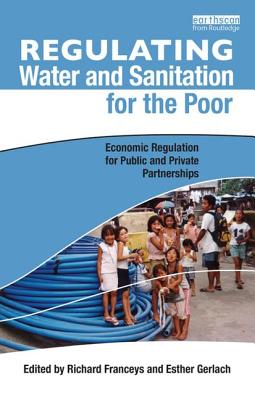''This excellent book makes a major contribution to the literature on regulation in a pro-poor direction for urban water supply. It is extremely relevant for policy-makers striving to achieve the Millennium Development Goal for halving the share of world''s population without access to clean and affordable water.''Andrew Nickson, University of Birmingham, UKThe aim of this book is to present the potential benefits as well as the challenges of introducing a more formal economic regulatory process into the urban water sector arena in lower-income countries. There is a particular focus upon the impact this may have on the poorest, the informal, slum and shanty dwellers of the rapidly growing cities. Economic regulation, usually introduced in the context of private operation of monopoly water supply, can deliver objectivity and transparency in the price-setting process for public as well as private providers.The book describes and analyses these issues through a consideration of ten country case studies. As a starting point, the current situation for the provision of water and sanitation services for the poorest through non-regulated public providers in India and Uganda is reviewed. Comparative chapters are then presented on Ghana, Philippines, Bolivia, Jordan, Zambia and Indonesia, all with varying degrees of private sector involvement and regulation. Finally the experiences of two richer countries are considered - Chile and England, countries with the longest experience of economic regulation and the ''most privatized'' suppliers. In all cases there is a focus on the very necessary role of customer involvement in price-setting and service monitoring and on the role of alternative (private) service providers.
'This excellent book makes a major contribution to the literature on regulation in a pro-poor direction for urban water supply. It is extremely relevant for policy-makers striving to achieve the Millennium Development Goal for halving the share of world's population without access to clean and affordable water.' Andrew Nickson, University of Birmingham, UK The aim of this book is to present the potential benefits as well as the challenges of introducing a more formal economic regulatory process into the urban water sector arena in lower-income countries. There is a particular focus upon the impact this may have on the poorest, the informal, slum and shanty dwellers of the rapidly growing cities. Economic regulation, usually introduced in the context of private operation of monopoly water supply, can deliver objectivity and transparency in the price-setting process for public as well as private providers. The book describes and analyses these issues through a consideration of ten country case studies. As a starting point, the current situation for the provision of water and sanitation services for the poorest through non-regulated public providers in India and Uganda is reviewed. Comparative chapters are then presented on Ghana, Philippines, Bolivia, Jordan, Zambia and Indonesia, all with varying degrees of private sector involvement and regulation. Finally the experiences of two richer countries are considered - Chile and England, countries with the longest experience of economic regulation and the 'most privatized' suppliers. In all cases there is a focus on the very necessary role of customer involvement in price-setting and service monitoring and on the role of alternative (private) service providers.
Get Regulating Water and Sanitation for the Poor by at the best price and quality guranteed only at Werezi Africa largest book ecommerce store. The book was published by Taylor & Francis Ltd and it has pages. Enjoy Shopping Best Offers & Deals on books Online from Werezi - Receive at your doorstep - Fast Delivery - Secure mode of Payment
 Jacket, Women
Jacket, Women
 Woolend Jacket
Woolend Jacket
 Western denim
Western denim
 Mini Dresss
Mini Dresss
 Jacket, Women
Jacket, Women
 Woolend Jacket
Woolend Jacket
 Western denim
Western denim
 Mini Dresss
Mini Dresss
 Jacket, Women
Jacket, Women
 Woolend Jacket
Woolend Jacket
 Western denim
Western denim
 Mini Dresss
Mini Dresss
 Jacket, Women
Jacket, Women
 Woolend Jacket
Woolend Jacket
 Western denim
Western denim
 Mini Dresss
Mini Dresss
 Jacket, Women
Jacket, Women
 Woolend Jacket
Woolend Jacket
 Western denim
Western denim
 Mini Dresss
Mini Dresss






























































